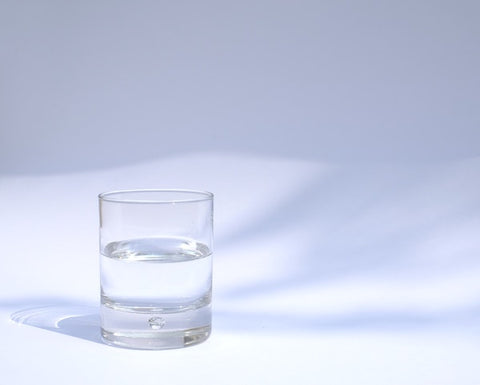Signs of Dehydration
1. Why am I so thirsty?

Your body has many ways to tell you that you’re dehydrated. Thirst is perhaps the most direct. You probably drink water a few times a day when your body prompts you to, but many of us don’t pay close enough attention to thirst. It’s simple enough to test for dehydration: Take a glass of water and start drinking—if you can drink the whole thing comfortably, you’re probably dehydrated. You should drink 2-4 liters of fluids a day. If you don’t, you run the risk of dehydration [2]. Even feeling slightly thirsty is a good indicator that you should have a drink.
Other dehydration symptoms are also related to thirst, such as having a dry or sticky feeling in your mouth or around your lips. Licking your lips is a great way to test if you’re dehydrated: the drier they are, the more likely you’re dehydrated. You might even find that your eyes feel dry when you blink as well [3].
2. Why is my Urine Dark?
Your pee is perhaps the clearest indicator of your hydration state.
Urine is made of two things: water, and waste from your body. Healthy pee is a light golden color and of a reasonable amount, perhaps enough to fill a soda can. As you become dehydrated, your body will start to add less and less water to your pee. But, you will still need to get rid of the same amount of waste, so your pee will become more and more concentrated. This means it gets darker and darker in color, you’ll begin to pee less frequently, perhaps only 3 times a day, and in smaller amounts. It might even burn when you pee, or smell particularly strong, because your urine is so concentrated with waste from your body, with not much water to dilute it [4,5].
Your pee can also tell you if you’re over-hydrated. The fluids in your body are made up of water mixed with salts. If you produce large amounts of clear pee then you’re probably hydrated with the wrong balance—too much water and not enough salt. It’s important to keep an eye on this too, as proper hydration involves the right water-salt balance.
3. Fuzzy Head?

Being even slightly dehydrated can give you a headache. You might also feel dizzy, or light-headed. However, headaches can be due to countless other things, so it can be hard to tell if your headache means you’re dehydrated. You’ll need to use some other indicators to help.
If you’re feeling sluggish or tired, or you’re struggling to concentrate it might be a sign that you’re dehydrated [6]. As you get more and more dehydrated, your body will start to discourage you from doing anything other than the basics, so that you can conserve fluids.
If you’re still not sure if it’s dehydration that’s bothering you, your general mood might also be an indicator. Grumpy? Irritable? Lethargic? These things can all mean that you’re dehydrated.
Finally, if you’ve recently exercised, or have an upset tummy, there’s a good chance you’re dehydrated.
Think you’re dehydrated? Take action.
Water has an essential role in keeping you at peak physical performance, controlling the temperature of your body, keeping your brain alert, and even keeping your gut in check. If you're not well hydrated, your body won't be able to keep up with your normal awesome self. But lots of things can slow you down, so how can you tell dehydration is the problem?

While filling up your water bottle, check in with yourself: Are you feeling thirsty? What color was your last pee? Is your head feeling a bit fuzzy? It’s ok! Just take a swig, and you’ve already taken action.
Each of these symptoms are likely the result of imbalanced fluid intake. You may be drinking too little (or too much!) water, or maybe your electrolyte balance is a bit out of whack. Drinking fluids containing the right balance of water and salts will restore your hydration balance, and get you feeling right as rain. (psst, check out Hydrant for how to get the right salt balance. We’ve done all the math and science for you!)
In some cases, dehydration can become so severe that you’ll need to seek medical attention. But by using these simple check-ins as indicators of hydration TLC, you can get your body back on track.
Author: Ailsa McKinlay. Ailsa is a student in Medicine and Theology at the University of Oxford, with special interest in public healthcare and health education.

















